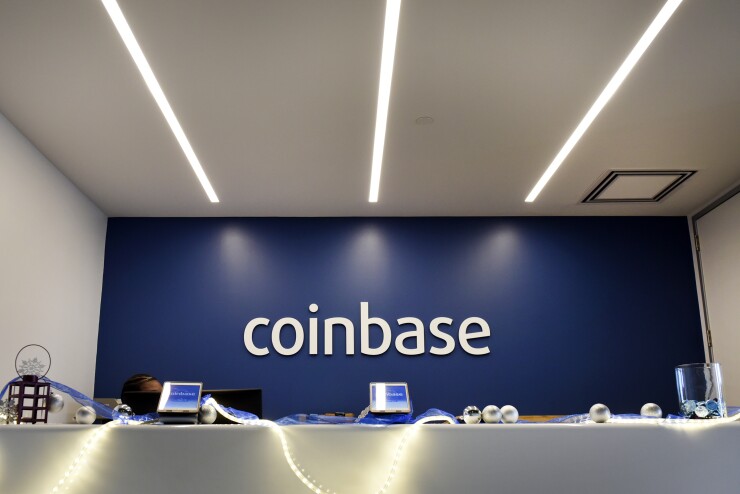The information you need to start your day, from PaymentsSource and around the web:
In the club
Visa has granted principal membership to Coinbase, giving the crypto exchange the ability to add more features to its
The membership allows Coinbase to directly issue cards and process payments in bitcoin, ether and XRP at Visa retailers, reports
But Coinbase told Forbes it does not have imminent plans to directly issue Visa cards, and Visa said the card brand itself would not accept cryptocurrency.
Tourist attraction
Chinese mobile payment apps have found travel to be a major revenue source, causing other payment companies to jump on the opportunity.
VR Payments has developed what it calls the "China Solution" which is a bundle for retailers that includes support for AliPay, WeChat Pay, and payment specialists at Volksbanken Raiffeisenbanken Cooperative, which helps retailers build e-commerce sites tailored for Chinese users.
The company hopes to reach merchants outside China that sell to travelers, then gain repeat business online when those travelers return home. The collaboration features language support for chat, marketing strategy and cross-border logistics.

Phone block
Asia Pacific Telecom and a U.S. telco have tested a cross-border blockchain transaction, allowing a customer of one carrier to make a payment to a user of the other carrier while roaming.
The Carrier Blockchain Study Group, which includes Softbank, Sprint and other telcos, is pushing the Asia Pacific model, which the telcos predict could create an alternative to global card networks, reports
Telcos have an uneven past in building payment networks, with the former
MIR's landing
Russia's national payment system will be part of a national effort to reduce cash in Tajikistan.
MIR cardholders will be able to make card and contactless payments at merchants and access Amonat Bank ATMs, with the initial users expected to be travelers from Russia. The bank and MIR will later expand to other MIR countries.
From the Web
TECH HQ | Wed February 19, 2020
In essence, our unchangeable human traits and characteristics have become our signatures. As such, mobile biometrics are predicted to authenticate US$2 trillion worth of in-store and remote digital payment transactions yearly by 2023, according to Juniper Research.
VICE | Wed February 19, 2020
Yodlee, the largest financial data broker in the U.S., sells data pulled from the bank and credit card transactions of tens of millions of Americans to investment and research firms, detailing where and when people shopped and how much they spent. Multiple senators have urged the Federal Trade Commission (FTC) to investigate Envestnet, which owns Yodlee, for selling Americans' transaction information without their knowledge or consent, potentially violating the law.
THE TIMES OF INDIA | Thu February 20, 2020
BSE-listed Infibeam Avenues Ltd on Wednesday said it has forayed into the US, the world's second largest digital payments market by revenue, and will offer its solutions to web and mobile-based small and medium enterprises (SME). The company will explore opportunities to partner and collaborate with large financial institutions including selective acquisitions to extend its digital payments solution reach to merchants and customers in the US.
More from PaymentsSource
Earnin, which provides advances on paychecks directly to consumers, is expanding to offer its services through employers.
For many international enterprises, cross-border e-commerce processing is table stakes. And the more complex the payment, the more important it is to handle it quickly.
Global fintech Ebanx is partnering with Uber to enable consumers in Brazil to pay for the ride-sharing service by topping up their Uber Cash balance with the country's voucher-based payment system.
Ally Financial in Detroit has agreed to buy CardWorks, a non prime credit card and consumer finance lender based in Woodbury, N.Y.
When established card networks such as Visa, American Express and Mastercard start investing in fintech lending platforms such as Divido and ChargeAfter — as well as in the fintech lenders themselves such as Klarna and Vyze — it’s a clear signal that the future of unsecured personal loans may not be delivered by banks.





